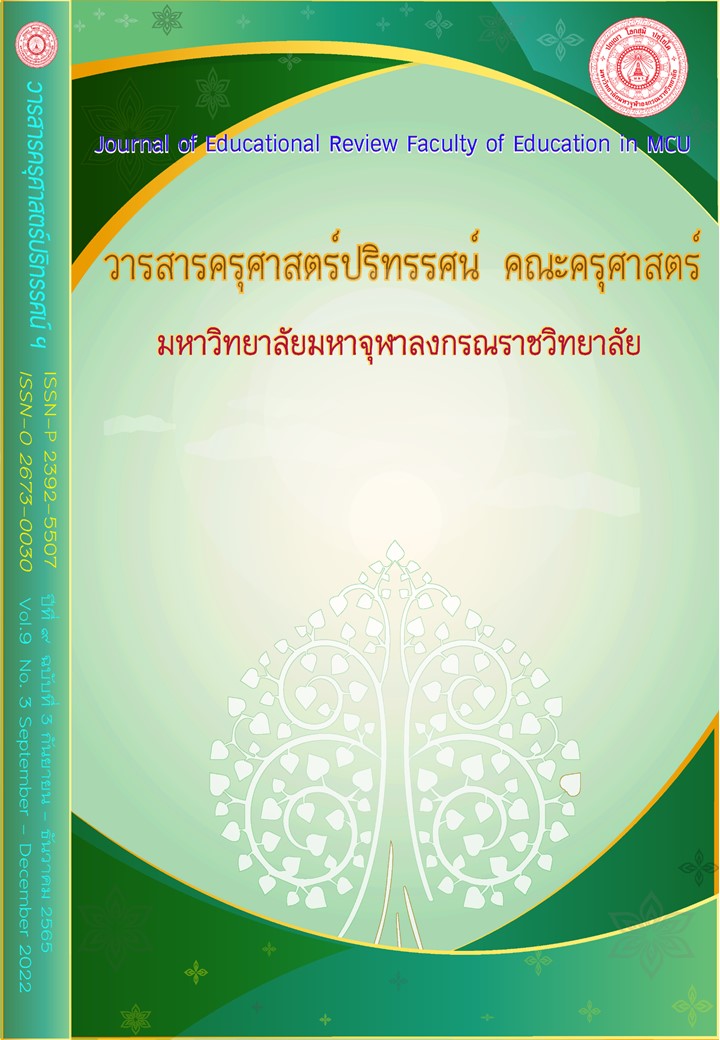DEVELOPMENT OF READING AND WRITING SKILLS FOR WORDS WITH THE TONE MARKS BY USING EDUCATIONAL GAMES OF PRATHOMSUKSA 1 STUDENTS AT ANUBAN NONTHABURI SCHOOL
Main Article Content
Abstract
The objectives of this research were 1) to improve the reading and writing skills on tonal words through educational games of the students in Primary 1 at Anuban Nonthaburi School. 2) to evaluate reading and writing skills on tonal words of the students in Primary 1 at Anuban Nonthaburi School after the activities to promote learning skills of reading and writing on tonal words with educational games. The sample group used in this research was 17 students who were studying in Primary 1/2 in the second semester of Academic Year 2020 at Anuban Nonthaburi School. This sample group was selected by purposive sampling. The research tools consisted of 12 lesson plans to improve reading and writing skills on tonal words with 12 educational games and a set of reading and writing skill test on tonal words. Data was analyzed by using basic statistics, mean, and percentage. The results of the research were as follows: 1) The students’ development during the course of reading and writing skills on tonal words by using educational games had an average score of 16.44 or 82.23 percent. Their reading skills had an average score of 16.35 or 81.77 percent while writing skills had an average score of 16.54 or 82.68 percent. Students had a higher score after the course at an average score of 0.21. 2) The assessment results from the reading and writing skill test of the students after the course had an overall average score of 16.65 or 83.2 percent, passing the specified criteria of 75 percent. The average score of their reading skills was 16.06 or 80.29 percent while their writing skills had an average score of 17.24, accounted for 86.18 percent.
Article Details

This work is licensed under a Creative Commons Attribution-NonCommercial-NoDerivatives 4.0 International License.
ทัศนะและความคิดเห็นที่ปรากฏในบทความในวารสารฉบับนี้ถือเป็นความรับผิดชอบของผู้เขียนบทความนั้นเพียงผู้เดียว และไม่ถือเป็นทัศนะและความรับผิดชอบของกองบรรณาธิการ
กองบรรณาธิการขอสงวนสิทธิ์ในการคัดเลือกบทความลงตีพิมพ์และจะแจ้งให้เจ้าของบทความทราบหลังจากผู้ประเมินบทความตรวจอ่านบทความแล้ว
ต้นฉบับที่ได้รับการตีพิมพ์ในวารสารครุศาสตร์ปริทรรศน์ คณะครุศาสตร์ มหาวิทยาลัยมหาจุฬาลงกรณราชวิทยาลัย ถือเป็นกรรมสิทธิ์ของคณะครุศาสตร์ มหาวิทยาลัยมหาจุฬาลงกรณราชวิทยาลัย ห้ามนำข้อความทั้งหมดหรือบางส่วนไปพิมพ์ซ้ำ เว้นเสียแต่ว่าจะได้รับอนุญาตจากมหาวิทยาลัยฯ เป็นลายลักษณ์อักษร
References
กระทรวงศึกษาธิการ. (2552). ตัวชี้วัดและสาระการเรียนรู้แกนกลางกลุ่มสาระการเรียนรู้ภาษาไทยตามหลักสูตร การศึกษาขั้นพื้นฐาน พุทธศักราช 2551. กรุงเทพมหานคร: ชุมนุมสหกรณ์การเกษตรแห่งประเทศไทย.
กาญจนา โพธิลักษณ์. (2554). การใช้เกมเสริมทักษะการอ่านคำที่มีตัวสะกดสำหรับนักเรียนชั้นประถมศึกษา ปีที่ 1 โรงเรียนเทศบาลวัดศรีปิงเมือง. วิทยานิพนธ์ศึกษาศาสตรมหาบัณฑิต. มหาวิทยาลัยเชียงใหม่.
เกษร สีหา. (2558). การพัฒนาการเขียนสะกดคำภาษาไทยโดยใช้เกมการศึกษาประกอบกิจกรรมการเรียนการสอน ชั้นประถมศึกษาปีที่ 3. วิทยานิพนธ์ครุศาสตรมหาบัณฑิต. มหาวิทยาลัยราชภัฏมาหาสารคาม.
จิตรดา ภูถาวร. (2555). การจัดการเรียนรู้โดยใช้เกมเพื่อพัฒนาการอ่านคำพื้นฐาน ชั้นประถมศึกษาปีที่ 2. วิทยานิพนธ์ครุศาสตรมหาบัณฑิต. มหาวิทยาลัยราชภัฏเชียงราย.
จุฑามาศ กันติ๊บ. (2554). การพัฒนาความสามารถในการเรียนรู้เรื่องการเขียนสะกดคำโดยใช้เทคนิคจิกซอว์ ร่วมกับเกมการศึกษาของนักเรียนชั้นประถมศึกษาปีที่ 1. วิทยานิพนธ์ศึกษาศาสตรมหาบัณฑิต. มหาวิทยาลัยศิลปากร.
ทิศนา แขมมณี. (2556). ศาสตร์การสอนองค์ความรู้เพื่อการจัดกระบวนการเรียนรู้ที่มีประสิทธิภาพ. พิมพ์ครั้งที่ 17. กรุงเทพมหานคร: จุฬาลงกรณ์มหาวิทยาลัย.
ประไพ สุวรรณสารคุณ. (2553). การพัฒนาผลสัมฤทธิ์ทางการเรียนด้านการเขียนสะกดคำยากของนักเรียนชั้นประถมศึกษาปีที่ 3 ด้วยการจัดการเรียนรู้โดยใช้เกมการศึกษา. วิทยานิพนธ์ศึกษาศาสตรมหาบัณฑิต. มหาวิทยาลัยศิลปากร.
สลิลรัตน์ คนเพียร. (2556). การพัฒนาการจัดกิจกรรมการเรียนรู้การอ่านออกเสียงคำพื้นฐานภาษาไทยโดยใช้หนังสืออ่านประกอบบทเรียนสำหรับนักเรียนชั้นประถมศึกษาปีที่ 1. วิทยานิพนธ์ครุศาสตร มหาบัณฑิต. มหาวิทยาลัยราชภัฏมหาสารคาม.
สำนักงานเขตพื้นที่การศึกษาประถมศึกษานนทบุรี เขต 1. (2558). คำสั่งสำนักงานเขตพื้นที่การศึกษา ประถมศึกษาที่ 204/2558 เรื่องแต่งตั้งคณะกรรมการขับเคลื่อนนโยบายปี 2558 เป็นปีปลอดนักเรียนอ่านไม่ออกเขียนไม่ได้และนักเรียนชั้นประถมศึกษาปีที่ 1 เมื่อจบชั้นประถมศึกษาปีที่ 1 ต้องอ่านออกเขียนได้และมีมาตรการประเมินผลเป็นรูปธรรม. แหล่งที่มา https://sites.google.com/a/kaned3.go.th/ngantidtam/kar-phathnakar-xan-kar-kheiyn สืบค้นเมื่อ 20 ก.ค. 2558.
สุวิทย์ มูลคำ และอรทัย มูลคำ. (2552). 20 วิธีจัดการเรียนรู้ เพื่อพัฒนาคุณธรรม จริยธรรมการเรียนรู้ด้วยการแสวงหาความรู้ด้วยตนเอง. พิมพ์ครั้งที่ 8. กรุงเทพมหานคร: ภาพพิมพ์.
เหงียน ถิ หญือ อี๊. (2556). การใช้เกมคำศัพท์เพื่อพัฒนาการเรียนรู้คำศัพท์ภาษาไทยของนักศึกษาชั้นปีที่ 1 มหาวิทยาลัยสังคมศาสตร์และมนุษย์ศาสตร์ นครโฮจิมินห์ สาธารณรัฐสังคมนิยมเวียดนาม. วิทยานิพนธ์ศิลปศาสตรมหาบัณฑิต. มหาวิทยาลัยศรีนครินทรวิโรฒ.
อรุณี ศุทธิชัย, อรัญญา ตุ้ยคำภีร์, จุฑาทิพย์ วิวัฒนาพันธุวงศ์ และพจ ธรรมพีร. (2563). ความเหนื่อยล้าทางจิตใจในบริบทที่เกี่ยวข้องกับการเรียน. e-Journal of Education Studies, Burapha University. 2(4). 27-40.
อัจฉรา ชีวพันธ์. (2552). ภาษาพาสอนเรื่องน่ารู้สำหรับครูภาษาไทย. พิมพ์ครั้งที่ 3. กรุงเทพมหานคร: จุฬาลงกรณ์มหาวิทยาลัย.
Anderson-Cooper, A. (2020). Using games as a tool to teach vocabulary to English language learners (Order No. 27956866) Available from ProQuest Dissertations and Theses Global. From https://www-proquest-com.portal.lib.ku.ac.th/dissertations-theses/using-games-as-tool-teach-vocabulary-english/docview/2469344175/se-2?accountid=48250 Retrieved November 29, 1999.
Dvorkovaya, M.V. and E.A. Kurenkova. (2015). The Significance of an Educational Game Teaching Politology. International Education Studies. 28(8). 5-6.


